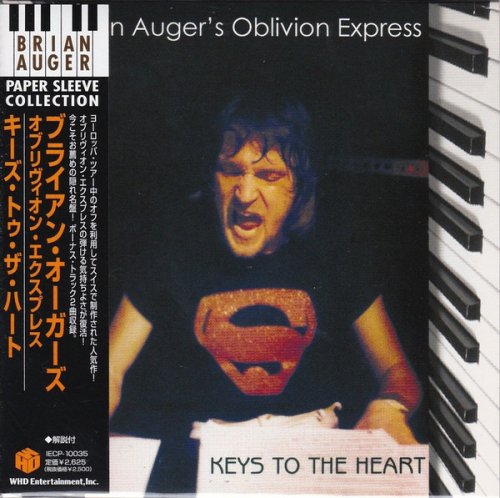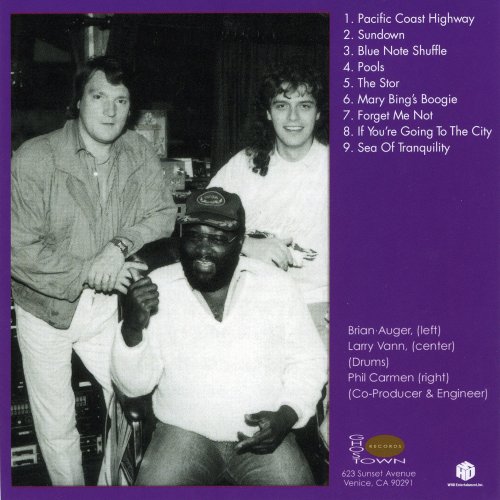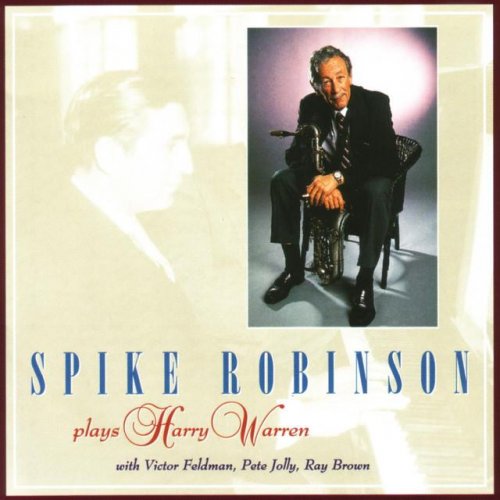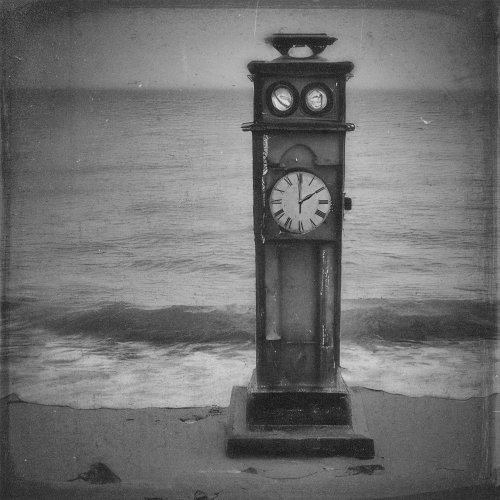Brian Auger's Oblivion Express - Keys To The Heart (Japan Remastered) (1987/2006)

Artist: Brian Auger's Oblivion Express
Title: Keys To The Heart
Year Of Release: 1987/2006
Label: WHD Entertainment
Genre: Prog Rock, Jazz-Funk, Jazz Rock
Quality: Mp3 320 / Flac (image, .cue, log)
Total Time: 01:02:02
Total Size: 156/397 Mb (scans)
WebSite: Album Preview
Title: Keys To The Heart
Year Of Release: 1987/2006
Label: WHD Entertainment
Genre: Prog Rock, Jazz-Funk, Jazz Rock
Quality: Mp3 320 / Flac (image, .cue, log)
Total Time: 01:02:02
Total Size: 156/397 Mb (scans)
WebSite: Album Preview

Tracklist:
1. Pacific Coast Highway
2. Sundown
3. Blue Note Shuffle
4. Pools
5. The Stor
6. Mary Bing's Boogie
7. Forget Me Not
Bonus Tracks:
8. If You're Going To The City
9. Sea Of Tranquility
Line-up::
Brian Auger: keyboards
Rick Hannah: guitar
Steve Evans: bass
Larry Vann: drums & percussion
Dick Morrissey: saxophones
Steve Dawson: trumpet
Brian Oger was born in London on July 18, 1939. He began to master the piano from the age of three, and even the war could not prevent him from playing music. As a child, Brian listened to Duke Ellington, Count Basie, Oscar Peterson, Bill Evans and other jazzmen, and they greatly influenced his tastes. In the early 60s, Oger was already rattling the piano in clubs, and in 1962, together with bassist Rick Laird and drummer Phil Knorroy, organized Brian Auger Trio. A couple of years later, according to the polls of the magazine "Melody Maker", Brian became the leader in the nominations "New Star" and "Jazz Piano", but soon after that the guy became interested in rhythm and blues and, adding to his team, guitarist John McLaughlin and saxophone player Glen Hughes, renamed the project to "Brian Auger Trinity". However, by the end of 1964, the band had collapsed, and Oger began playing the "Hammond B-3" organ with bassist Rick Brown and drummer Mickey Waller. In this company, Brian tried to record some singles, and in 1965 he got to the session of Sonny Boy Williamson's album "Don't Send Me No Flowers". Then the musician spent about a year in the project "Steampacket", where his partners were Long John Baldry, Vic Briggs, Rod Stewart and Julie Driscoll. This formation also proved to be unstable, but after its collapse, Brian engaged Julie for the new version of "Trinity". The jazz-rock debut album "Open" initially did not arouse much interest, but the come-up single with Dylan's cover of "This Wheel's On Fire" still pushed the work into the British charts. In 1968, "Trinity" released the instrumental record "Definitely What!", And the following year, Driscoll returned to the microphone. With her participation, the twin "Streetnoise" was created, drawing the attention of the overseas public to the group. During the American tour, Julie left the team again, but after she left, the band continued to make jazz-rock cocktails with an admixture of soul and psychedelia, as evidenced by the album "Befour". This work turned out to be the last for "Trinity", and Oger, who decided to play less commercial music, put together another band called Oblivion Express. Brian had no idea that the project would live for a long time, but the third “express” album, on which singer Alex Ligertwood made his debut, hit the charts. The following several records regularly bombarded American lists of popularity, so by 1975 Oger had moved to San Francisco. The most powerful work of this period was the disc "Closer To It!", On which the musician demonstrated the power of his keyboard attacks. After the album "Reinforcements", made in the spirit of "Average White Band", the circulation of the plates "Oblivion Express" began to decline, but Brian managed to make a deal with "Warner Bros". In 1977, the haunted opus "Happiness Heartaches" was released, and the following year, Oger, reunited with Julie Tippetts (formerly Driscoll), released the disc "Encore". After that, the major contract was lost, and Brian put the “express” on the siding. In the 80s, the musician made a number of experimental works, but then, leaving fruitless attempts, moved away from studio activities. The offensive of the 90s was marked by cooperation with Eric Birdon, and by the end of the decade Oger reanimated "Oblivion Express", attracting its children to the project. The group took up performances, but shortly before the musician turned 61, the album "Voices Of Other Times" was released. Here, Brian returned to soul-funk-jazz, and four out of ten numbers were borrowed from his back catalog.
![Mark Nightingale, Alan Barnes & James Davison - Jazz Classics ...with a Twist (2026) [Hi-Res] Mark Nightingale, Alan Barnes & James Davison - Jazz Classics ...with a Twist (2026) [Hi-Res]](https://www.dibpic.com/uploads/posts/2026-02/1772036652_1.jpg)


![Cheo Feliciano - Mi Tierra y Yo (Remastered 2026) (2026) [Hi-Res] Cheo Feliciano - Mi Tierra y Yo (Remastered 2026) (2026) [Hi-Res]](https://img.israbox.com/img/2026-02/26/3utwbyq7th3hn4a5zsf7qsky1.jpg)

![Alcides Neto - Amú (2026) [Hi-Res] Alcides Neto - Amú (2026) [Hi-Res]](https://img.israbox.com/img/2026-02/26/mtckmw6jmvula60sukh6h3h26.jpg)


